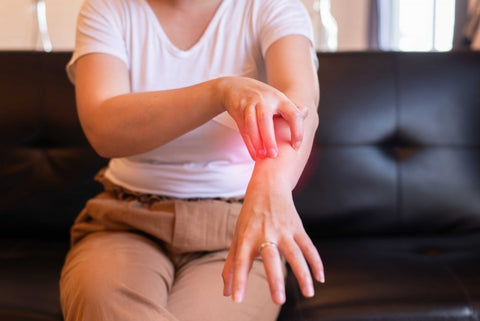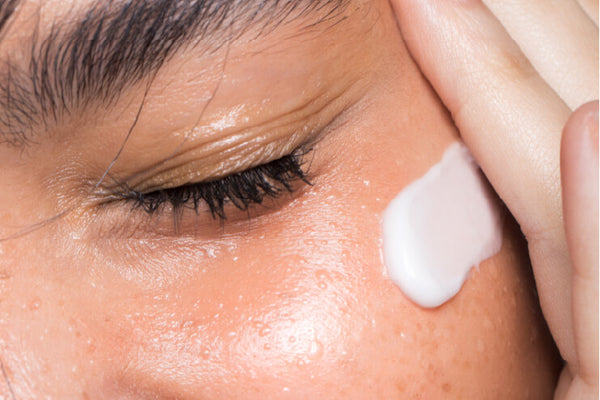Note: "Add 2 products to avail Buy 1 Get 1.
Not Applicable on Combo products."
Dry Rough Patches On The Skin: Causes And Treatment

If you’ve noticed dry and rough patches of skin on your body, then you’re not alone. Many people experience these dry spots and it can be a result of many factors including changes in weather, temperature, or humidity, using harsh soaps and harsh chemicals, and skin conditions like eczema, psoriasis. Dry and rough skin patches can feel rough and scaly in only certain areas, which is different than having overall dry skin.
In most cases, people can get rid of dry and rough skin using home remedies and over-the-counter (OTC) treatments.
While dry skin patches can crop up anywhere, they are often seen on the:
- Face
- Eyelids
- Elbows
- Lower arms
- Hands or wrists
- Feet or ankles
- Chest
- Knees or lower legs
Causes of dry rough patches on the skin
Contact dermatitis: It is a skin condition that occurs when you come in contact with any substance that causes a skin reaction. This skin condition is not contagious and can be treated usually with steroid creams or oral medications.
Eczema: It is a chronic skin disease that mainly affects children, but it can also develop at a later age. It is also called atopic dermatitis.
Psoriasis: It is an autoimmune disorder in which you may develop scaly, itchy patches of skin on the body. It is a chronic condition that can be caused by stress, smoking, alcohol drinking, infections, certain medications, and vitamin D deficiency.

Dehydration: If you don't drink enough water, it can show on your skin. Dehydration will leave your skin dry which may appear rough and scaly at times.
Nutritional deficiencies: When your body doesn't get enough calcium, vitamin D, or vitamin E, then you might develop dry and rough patches on the skin. It can be treated by having a balanced diet or by taking supplements.
Smoking: Smoking causes dehydration which can then trigger dry skin. Smoking can also lead to wrinkles and other signs of aging.

Stress: Stress can affect your body in so many ways. And if you have skin conditions like psoriasis or eczema, stress can worsen the condition.

Soaps and over-washing: Using harsh soaps, antiperspirants or perfumes may cause your skin to dry. Also, taking long hot showers can worsen the problem.
Other causes of dry skin:
- Cold weather
- Dry air
- Unbalanced skin pH
- Diabetes
- Hypothyroidism
- Spending too much time in direct sunlight
How to prevent patches of dry skin

Things to do:
- Use a moisturizer or moisturizing lotion every day to keep your skin hydrated
- Take bath only once a day
- Limit your bathing time to 10 minutes or less
- Use moisturizing body wash and hand soap
- Use a humidifier to add moisture to the air in your house
- Cover up your skin, especially in hot or cold weather
- Drink plenty of water throughout the day
- Wear cotton and natural fiber clothes
- Limit your caffeine intake
- Manage stress as it can aggravate eczema and other skin conditions
Things to avoid:
- Avoid using strong soaps and detergents
- Limit your exposure to irritants such as solvents
- Avoid wearing wool clothes
- Avoid rubbing or itching your dry skin
- Avoid hot baths or showers
- Stop smoking as nicotine reduces blood flow, which dries out skin
- Minimize sun exposure, as it evaporates oils and moisture from the skin
- Avoid artificial tanning
- Avoid over-exfoliation
When to seek help?
You must see a doctor if your dry skin conditions become severe. It is also a good idea to get your dry skin condition checked out if you think it might be a sign of an underlying disease.
Summing up
Usually, dry skin is not a serious health issue. However, chronic or persistent dry skin may be an indication of an underlying health condition, such as dermatitis, psoriasis, or allergies. Take care of your skin and keep it hydrated to avoid the complications of dry skin.


